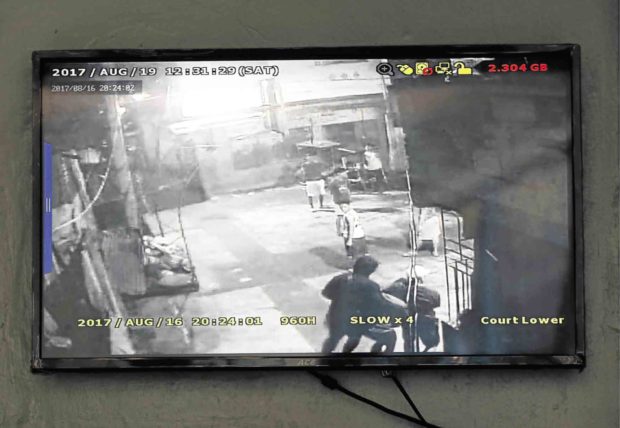CHR’s drug war probe: Some ops probably fake, suspects already subdued when killed

CCTV frame shows Kian delos Santos, his head covered with a shirt, being dragged off by two persons past a basketball court.
MANILA, Philippines — The Commission on Human Rights (CHR) raised new concerns about the government’s war against illegal drugs, as eyewitnesses’ testimony supposedly raised questions about whether some of the operations were really conducted, and whether suspects were not subdued before being killed.
In a statement from CHR Commissioner Gwendolyn Pimentel-Gana, she said that an investigation into 579 drug-related incidents in Metro Manila, Central Luzon, and Calabarzon contradicted police reports and eyewitness accounts.
For example, some drug war suspects are said to be incapable of firing a shot at the police, and some of those killed seem not to have been targets of operations — similar to slain teenager Kian delos Santos.
“There are also other patterns of discrepancies based on eyewitness accounts during drug operations by law enforcers, including: that the alleged operations might have not actually been conducted; that alleged ‘nanlaban’ victims could not have initiated a shootout; that some victims were said to be already under police custody when they were killed,” Pimentel-Gana said on Tuesday.
“[…] that allegedly unjustified violence was prevalent in the conduct of said operations; that planting of evidence was observed by witnesses in some incidents; and that some victims killed might not have been the intended target of the operations,” she added.
Additionally, CHR stressed that of the 870 victims from the 579 cases it looked into, 71 were women and 24 were minors. At least 451 incidents in the 579 cases were attributed to police officers, 104 were done by unidentified individuals, and 24 cases have no significant data about them.
Most of the cases jive along with the police’s claim that drug suspects initiated the firefight, or what is commonly known as ‘nanlaban.’ However, CHR found out that only 11 individuals — a measly two percent — survived the killings.
But aside from gunshot wounds on the bodies of the suspect, there were instances when blunt force trauma was found on the cadavers — suggesting that they were hit with an impactful force, and not just by bullets.
“The 451 cases of killings allegedly linked to police operations tallied 705 victims and, out of this number, the police claims 466 individuals initiated aggression or resisted arrest or the so-called ‘nanlaban’ cases. However, despite police protocols prescribing necessary and reasonable force in subduing resistance by an aggressor, only two percent or 11 individuals survived the alleged ‘nanlaban’ incidents,” Pimentel-Gana said.
“Records of at least 87 victims contained information on the wounds or injuries found—mostly multiple gunshot wounds on different parts of the body, usually the head, chest, trunk, and abdomen. Blunt force and injury and lacerations were also found on some of the victims,” she explained.
Most of the police officers involved in the incidents also showed that they were even given promotions if they were not absolved from criminal and administrative liability.
“[…] 77 out of 90 reports complete with results of internal investigation findings contained recommendations that police operatives involved in the said incidents are either to be awarded, rewarded, or recognized,” Pimentel-Gana noted.
“Some reports, while no mention of commendation, upheld legitimacy of operations and, in few reports, recommended that participating operatives be absolved from criminal or administrative liability,” she added.
INQUIRER.net has sought the side of the Philippine National Police (PNP), the main implementer of President Rodrigo Duterte’s drug war, but they have not replied as of posting time.
The drug war has been a major criticism hurled at Duterte’s administration, drawing local and international condemnation due to the bloody drug war and allegedly disregarding human rights in the process.
As of now, police officers have been held accountable in only one drug war-related death — that of Delos Santos, after a Caloocan court deemed three officers guilty as closed-circuit television camera footage showed them dragging the minor to a dark alley before he was shot.
The court also admitted that Delos Santos was not the police’s original target.
READ: Kian’s case: Litmus test for Duterte drug war
READ: 3 policemen guilty of killing Kian delos Santos — court
But aside from Delos Santos, there are still several drug war deaths that have yet to be explained, like the death of 17-year-old Joshua Laxamana, whom police said tried to fight it out with them in a Pangasinan drug operation.
However, the victim’s mother claimed that the minor was only going back to Tarlac after watching a DoTA tournament in Baguio City. She also debunked claims that Laxamana was a part of the drug trade, adding that the tattoo used as evidence by the police was merely a DoTA character.
READ: Mother of slain ‘Dota’ player files murder raps vs Pangasinan cops
Currently, Duterte and other police officers face crimes against humanity complaints before the International Criminal Court (ICC) for their role in the drug war.
CHR hopes to continue partnering with the government to uncover the truth and prove that the country’s justice system is functional.
“With these findings, CHR continues to reaffirm its willingness to partner with the government in uncovering the truth behind these incidents of killings and other forms of violence allegedly linked to the government anti-drug campaign,” Pimentel-Gana said.
“CHR stresses that speedy, impartial, and transparent investigations are crucial in delivering justice; thereby, addressing the observed ‘persistent impunity and formidable barriers to accessing justice’ flagged by the UN Human Rights Office to the Philippine Government,” she added.
READ: ICC pre-trial chamber authorizes start of probe into Duterte’s drug war